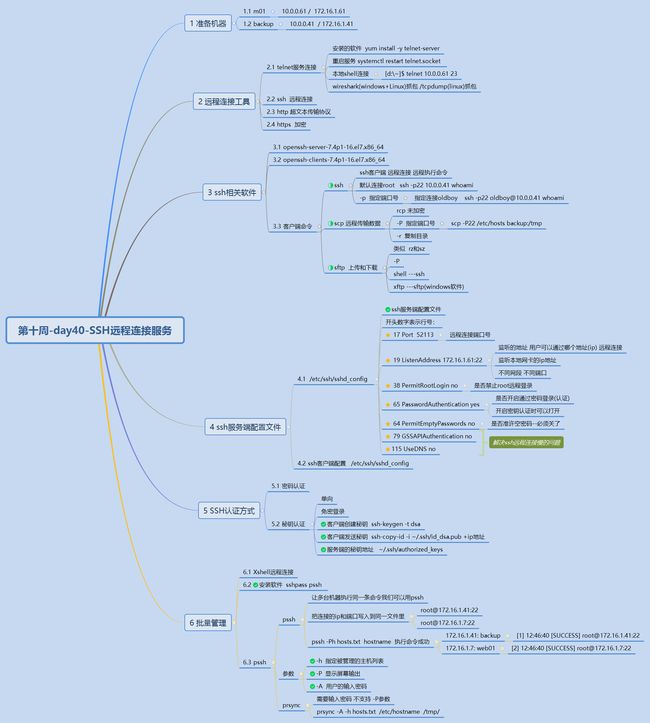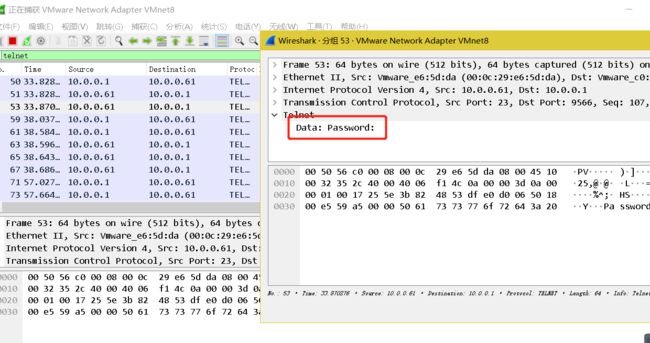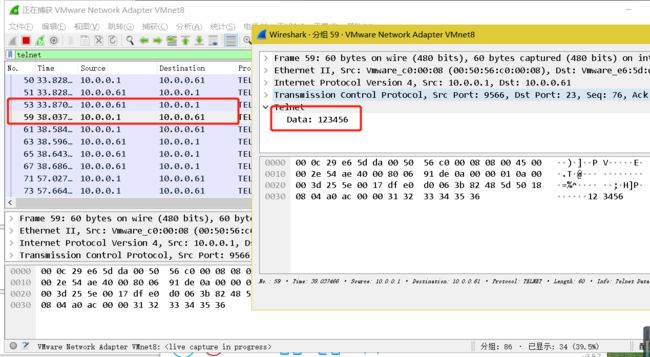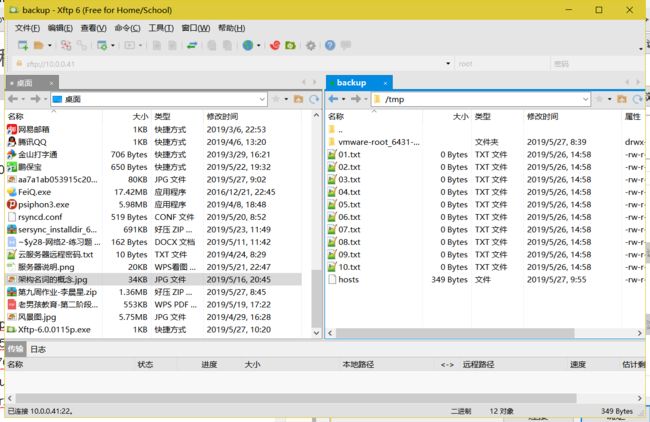SSH服务
准备工作-2台机器
m01:
10.0.0.61 / 172.16.1.61
backup:
10.0.0.41 / 172.16.1.41
远程连接工具
ssh
telnet服务
sftp上传下载
一、SSH VS telnet
需要安装的软件
yum install -y telnet-server
1.确认是否安装,重启一下
[09:10 root@m01 ~]# rpm -qa telnet-server
telnet-server-0.17-64.el7.x86_64
[09:13 root@m01 ~]# systemctl restart telnet.socket
2.添加一个telnet 连接的模板机
3.本地shell连接一下
visudo里提前添加好 oldboy ALL=(ALL) NOPASSWD:ALL
[d:\~]$ telnet 10.0.0.61 23
Connecting to 10.0.0.61:23...
Connection established.
To escape to local shell, press 'Ctrl+Alt+]'.
Kernel 3.10.0-957.el7.x86_64 on an x86_64
m01 login: oldboy
Password:
Last login: Mon May 27 09:22:26 from ::ffff:10.0.0.1
[09:24 oldboy@m01 ~]$ hostname -I
10.0.0.61 172.16.1.61
4.用wireshark(windows+Linux)抓包 /tcpdump(linux)抓包
对应着本地连接的顺序
输入密码:
密码为123456
登录后显示的日期时间
显示PS1的变量
5.检查ssh软件是否安装
[09:18 oldboy@m01 ~]$ rpm -qf `which ssh`
openssh-clients-7.4p1-16.el7.x86_64
[09:36 oldboy@m01 ~]$ rpm -qf `which scp`
openssh-clients-7.4p1-16.el7.x86_64
[09:36 oldboy@m01 ~]$ rpm -qf /etc/ssh/sshd_config
openssh-server-7.4p1-16.el7.x86_64
查看详细内容:
rpm -ql openssh
rpm -ql openssh-clients
rpm -ql openssh-server
6.第一次连接某台服务器的时候会提示
[09:39 oldboy@m01 ~]$ ssh 10.0.0.41
The authenticity of host '10.0.0.41 (10.0.0.41)' can't be established.
ECDSA key fingerprint is SHA256:88rBReEHynIVVIC2gIUWhJmKf55XkLnQMzZ/Gntdt48.
ECDSA key fingerprint is MD5:34:f7:e4:ea:d9:45:cc:7f:c5:94:2d:43:71:47:19:0c.
Are you sure you want to continue connecting (yes/no)? yes
7.在客户端连接backup执行一条命令或多条命令
[09:44 root@m01 ~]# ssh -p22 10.0.0.41 whoami
[email protected]'s password:
root
[09:45 root@m01 ~]# ssh -p22 [email protected] whoami
[email protected]'s password:
oldboy
[09:48 root@m01 ~]# ssh -p22 10.0.0.41 whoami;id;pwd
[email protected]'s password:
root
uid=0(root) gid=0(root) groups=0(root)
/root
8.取个ip玩玩
不要接太复杂的命令
[09:52 root@m01 ~]# ssh -p22 [email protected] ip a s eth0|awk 'NR==3{print $2}'
[email protected]'s password:
10.0.0.41/24
二、scp 远程传输数据
rcp 未加密
-P 指定端口号
-r 复制目录
[[09:54 root@m01 ~]# scp -P22 /etc/hosts backup:/tmp
hosts 100% 349 205.2KB/s 00:00
[[09:54 root@backup ~]# ll /tmp/
total 4
-rw-r--r-- 1 root root 349 May 27 16:50 hosts
三、sftp上传和下载
类似 rz和sz
用sftp连接一下backup服务端
[09:59 root@m01 ~]# sftp 10.0.0.41
[email protected]'s password:
Connected to 10.0.0.41.
sftp> pwd
Remote working directory: /root
1.put—从本地上传到服务端41
sftp> put /etc/hostname
Uploading /etc/hostname to /root/hostname
/etc/hostname 100% 4 9.9KB/s 00:00
2.get—从服务端41下载到本地
sftp> get /etc/hostname /opt/
Fetching /etc/hostname to /opt/hostname
/etc/hostname 100% 7 6.0KB/s 00:00
sftp> bye \\退出
3.在两端查看一下传过过来了没
m01:
[10:03 root@m01 ~]# cat /opt/hostname
backup
backup:
[10:04 root@backup ~]# cat hostname
m01
4.连接指定端口号参数用 -P +端口号
[10:04 root@m01 ~]# sftp -P 22 10.0.0.41
[email protected]'s password:
Connected to 10.0.0.41.
sftp> pwd
Remote working directory: /root \\当前在root目录工作
windows上的远程连接工具—xftp 6.exe
点此链接下载xftp提取码: wc5p
※四、ssh服务端配置文件
1.ssh服务端配置文件/etc/ssh/sshd_config
[16:14 root@m01 ~]# vim /etc/ssh/sshd_config \\目前只列出主要修改的内容
17 #Port 22 \\远程连接端口号
19 #ListenAddress 0.0.0.0 \\监听的地址 用户可以通过哪个地址(ip) 远程连接
\\监听本地网卡的ip地址
\\不同网段 不同端口
38 #PermitRootLogin yes \\是否禁止root远程登录
64 #PermitEmptyPasswords no \\是否准许空密码--必须关了
65 PasswordAuthentication yes \\是否开启通过密码登录(认证)
\\开启密钥认证时可以打开
79 GSSAPIAuthentication no \\解决ssh远程连接慢的问题
115 UseDNS no \\解决ssh远程连接慢的问题
2.修改ssh配置文件如下两行
[10:58 root@m01 ~]# egrep -i '^port|^permitroot' /etc/ssh/sshd_config
Port 52113
PermitRootLogin no
3.指定内网IP连接,平滑重启sshd服务
ListenAddress 172.16.1.61
[11:09 root@m01 ~]# ss -lntup|grep sshd
tcp LISTEN 0 128 *:22 *:* users:(("sshd",pid=7188,fd=3))
tcp LISTEN 0 128 :::22 :::* users:(("sshd",pid=7188,fd=4))
[11:10 root@m01 ~]# systemctl reload sshd.service
[11:10 root@m01 ~]# ss -lntup|grep sshd
tcp LISTEN 0 128 172.16.1.61:22 *:* users:(("sshd",pid=7188,fd=3))
案例:多个网段多端口
ssh配置文件修改端口号为:Port 52113
尝试在别的机器上用ssh scp sftp连接内网段和外网段的 不同端口
连接外网段 全部报错 :
ssh -p 52113 10.0.0.61
sftp -P 52113 10.0.0.61
scp -P 52113 /etc/hosts 10.0.0.61:/tmp
[11:14 root@backup ~]# ssh -p 52113 10.0.0.61
ssh: connect to host 10.0.0.61 port 52113: Connection refused \\报错:
连接内网段 全部可以执行:
ssh -p 52113 172.16.1.61
sftp -P 52113 172.16.1.61
scp -P 52113 /etc/hosts 172.16.1.61:/tmp
[11:14 root@backup ~]# ssh -p 52113 172.16.1.61
[email protected]'s password:
Last login: Mon May 27 17:08:49 2019 from 172.16.1.41
[17:14 root@m01 ~]# \\成功
4.修改ssh配置文件/etc/ssh/sshd_config
20 ListenAddress 10.0.0.61:52113
21 ListenAddress 172.16.1.61:22
平滑重启后查看端口号
[11:25 root@m01 ~]# systemctl reload sshd
[11:25 root@m01 ~]# ss -lntup |grep sshd
tcp LISTEN 0 128 10.0.0.61:52113 *:* users:(("sshd",pid=7188,fd=4))
tcp LISTEN 0 128 172.16.1.61:22 *:* users:(("sshd",pid=7188,fd=3))
本地shell连接一下
之前已经创建了oldboy普通用户
并在visudo里提前添加好 oldboy ALL=(ALL) NOPASSWD:ALL
禁止了root远程登录 PermitRootLogin no
[d:\~]$ ssh [email protected] 52113 不通
[d:\~]$ ssh [email protected] 52113 通了
Last login: Mon May 27 16:40:36 2019 from 10.0.0.1
[17:22 oldboy@m01 ~]$
三、秘钥连接
SSH认证方式
密码认证
秘钥认证
秘钥认证
单向的认证
免密登录
步骤:
安装软件 sshpass pssh
客户端创建秘钥 ssh-keygen -t dsa
客户端发送秘钥 ssh-copy-id -i ~/.ssh/id_dsa.pub +ip地址
服务端的秘钥地址 ~/.ssh/authorized_keys
1.安装软件,保证端口号是22
yum install -y sshpass pssh
[12:11 root@m01 ~]# ss -lntup|grep sshd
tcp LISTEN 0 128 *:22 *:* users:(("sshd",pid=7188,fd=3))
tcp LISTEN 0 128 :::22 :::* users:(("sshd",pid=7188,fd=4))
2.创建秘钥
ssh-keygen -t dsa
[12:11 root@m01 ~]# ssh-keygen -t dsa \\创建秘钥的命令
Generating public/private dsa key pair.
Enter file in which to save the key (/root/.ssh/id_dsa):
Enter passphrase (empty for no passphrase):
Enter same passphrase again:
Your identification has been saved in /root/.ssh/id_dsa. \\你的私钥路径
Your public key has been saved in /root/.ssh/id_dsa.pub. \\你的公钥路径
The key fingerprint is:
SHA256:wsT45xD36AFN6onAidMbvLRJrj8dC0zaJIyrP6/RpJ0 root@m01
The key's randomart image is:
+---[DSA 1024]----+
| . |
| = . o + |
|= X . * o |
|o*oB * = o |
| O* o B S . |
|o.+=.. * . |
|o ooEo o |
|..o.o |
| .+=. |
+----[SHA256]-----+
3.在客户端m01发送:
[12:16 root@m01 ~]# ssh-copy-id -i ~/.ssh/id_dsa.pub 172.16.1.41
/usr/bin/ssh-copy-id: INFO: Source of key(s) to be installed: "/root/.ssh/id_dsa.pub"
/usr/bin/ssh-copy-id: INFO: attempting to log in with the new key(s), to filter out any that are already installed
/usr/bin/ssh-copy-id: INFO: 1 key(s) remain to be installed -- if you are prompted now it is to install the new keys
[email protected]'s password:
Number of key(s) added: 1
Now try logging into the machine, with: "ssh '172.16.1.41'"
and check to make sure that only the key(s) you wanted were added.
4.在客户端就可以免密连接了
[12:16 root@m01 ~]# ssh 172.16.1.41 hostname
backup
[12:21 root@m01 ~]# ssh 10.0.0.41 animalsay a
___
< a >
---
\ _
\ (_) <-- TeleBEARS
\ ^__^ / \
\ (oo)\_____/_\ \
(__)\ you ) /
||----w ((
|| ||>> ....
5.我们可以去服务端backup看一下秘钥的目录
~/.ssh/ 当前目录下的.ssh
[12:16 root@backup ~]# ll ~/.ssh/
total 8
-rw------- 1 root root 598 May 27 12:16 authorized_keys
-rw-r--r-- 1 root root 683 May 27 11:12 known_hosts
6.我们打开web01机器也给web01添加秘钥认证
把秘钥文件发送到web01
[12:34 root@m01 ~]# ssh-copy-id -i ~/.ssh/id_dsa.pub 172.16.1.7
查看web01下的秘钥文件
[12:33 root@web01 ~]# ll .ssh/
total 4
-rw------- 1 root root 598 May 27 12:34 authorized_keys
7.客户端m01取个web01的ip
[12:34 root@m01 ~]# ssh 172.16.1.7 ip a s eth0|awk -F"[ /]+" 'NR==3{print $3}'
10.0.0.7 \\成功
四、批量管理
Xshell
pssh
pssh
让多台机器执行同一条命令我们可以用pssh
参数
-h 指定被管理的主机列表
-P 显示屏幕输出
-A 用户的输入密码
1.检查是否安装
[12:39 root@m01 ~]# rpm -qa pssh
pssh-2.3.1-5.el7.noarch
2.创建一个文件,写入连接的ip和端口
[12:44 root@m01 ~]# vim hosts.txt
[email protected]:22
[email protected]:22
3.然后用pssh执行一条命令,看是否执行成功
[12:44 root@m01 ~]# pssh -Ph hosts.txt hostname
172.16.1.41: backup
[1] 12:46:40 [SUCCESS] [email protected]:22
172.16.1.7: web01
[2] 12:46:40 [SUCCESS] [email protected]:22
4.如果删除秘钥的话
用pssh推送失败
[12:50 root@m01 ~]# rm -rf .ssh/ *
[12:50 root@m01 ~]# pssh -Ph hosts.txt touch 888.txt
[1] 12:50:20 [FAILURE] [email protected]:22 Exited with error code 255
[2] 12:50:20 [FAILURE] [email protected]:22 Exited with error code 255
5.用prsync传输也可以了
需要输入密码 但是不支持 -P参数
[12:52 root@m01 ~]# prsync -A -azh hosts.txt /etc/hostname /tmp/
Warning: do not enter your password if anyone else has superuser
privileges or access to your account.
Password:
[1] 12:52:49 [SUCCESS] [email protected]:22
[2] 12:52:49 [SUCCESS] [email protected]:22
6.用pssh查看一下推送到/tmp下的hostname
[17:54 root@m01 ~]# pssh -A -Ph hosts.txt cat /tmp/hostname
Warning: do not enter your password if anyone else has superuser
privileges or access to your account.
Password:
172.16.1.7: m01
[1] 17:54:41 [SUCCESS] [email protected]:22
172.16.1.41: m01
[2] 17:54:41 [SUCCESS] [email protected]:22
测试后记得把秘钥分发到backup和web01
分享自51cto博客的:
不死鸟一辉
一次ssh被篡改的***事件
https://blog.51cto.com/phenixikki/1546669
未完待续....








